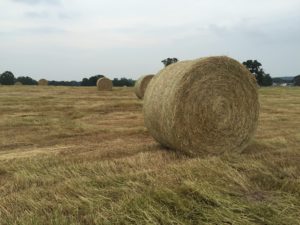After mowing, poor weather and handling conditions can lower hay quality. Rain can cause leaf loss and can leach nutrients from plants during curing. Rain can leach out nutrients and increase dry matter loss from respiration, which is the process by which a plant uses oxygen. Nutrient losses depend on the amount, duration and timing of the rain in relation to cutting time.
Purdue University has conducted research on the amount of total digestible nutrients (TDN) and field dry matter lost from hay after a rain. The study found that 1 inch of rain reduced the TDN content of field-cured hay by 5 percentage points. Field dry matter losses from undried wind-rowed hay were 3.5% per inch of rain. In general, fewer nutrients are leached out during a quick 1-inch rain than during a slow, soaking 1-inch rain.
Rain-induced losses are much higher in drier hay than in hay that is fresh cut. Also, rain-soaked hay must often be re-raked, which increases leaf losses. Although conditioning can reduce hay drying time, rain causes greater nutrient losses for hay that has been conditioned or crushed.
Forage plants are living tissues that continue to respire when cut until the moisture content falls below 40%. If the drying conditions are poor (such as with high humidity, cloudy skies or low temperatures), the plant will use more of the readily digestible carbohydrates, sometimes up to 10 to 15% of the original dry matter.
Researchers at the Texas A&M AgriLife Research & Extension Center, Overton, TX studied the effects of drying on the crude protein (CP) content and TDN of Coastal bermudagrass hay. They found that the CP content dropped from 11.1% to 8.9% after 2 days of drying. In that same period, TDN dropped from 51.6% to 42%.
To reduce haymaking losses, producers should:
- Cut hay at the proper stage of maturity.
- Cure the hay as fast as possible.
- Minimize excess manipulation of the hay.
- Bale the hay promptly when it is dry.
- Store it according to bale type.
Vanessa Corriher-Olson
Professor, Forage Extension Specialist
Soil & Crop Sciences
Texas A&M AgriLife Extension, Overton,TX
903-834-6191
